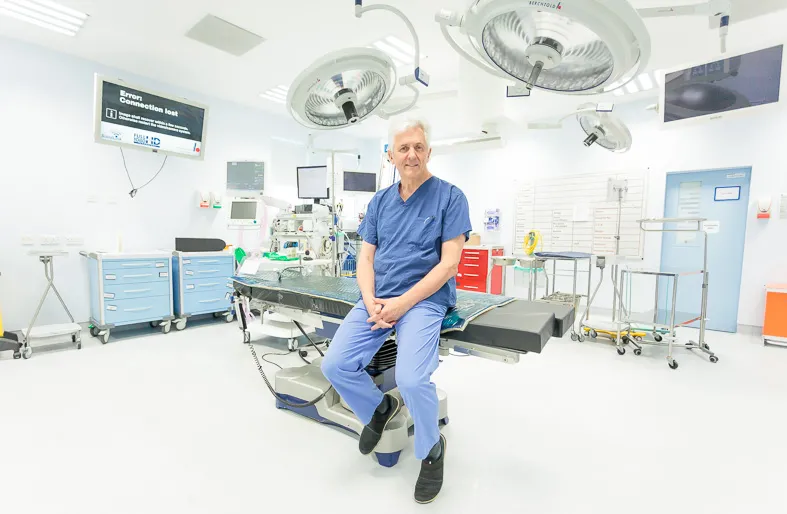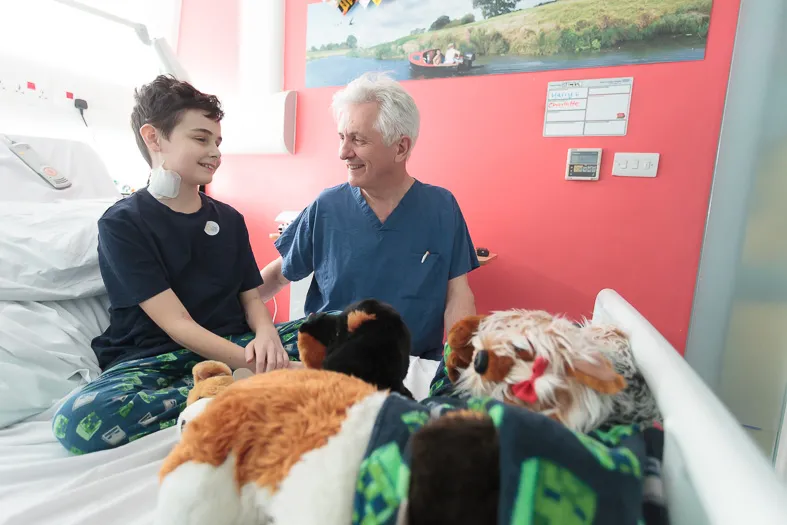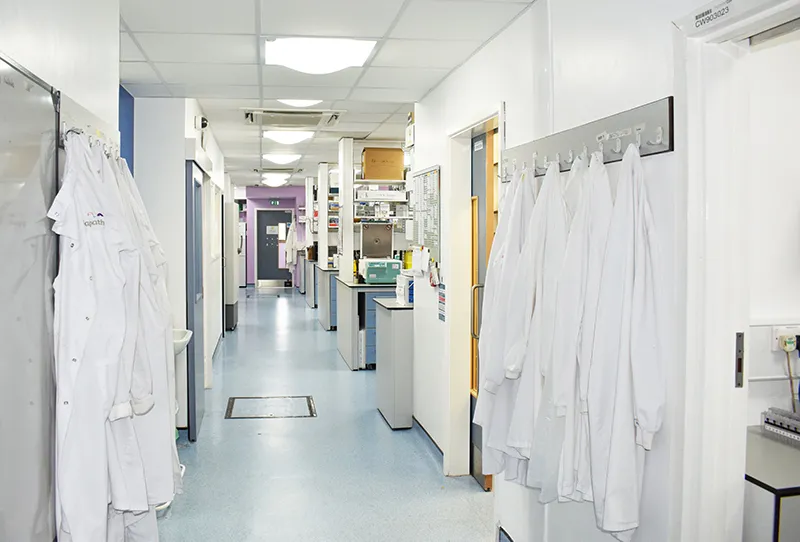Transforming lives
“Over the years I’ve seen how liver transplantation has transformed people’s lives,” says Professor Heaton.
“As a student and trainee doctor I remember seeing children with end-stage liver disease dying through the lack of any treatment that would save them, whereas now it’s uncommon to see children die from liver disease.
“It still amazes me that someone can be close to dying, but just a day after surgery they can be having a drink and talking to you and within ten days they can be out of hospital. It is an extraordinary thing to see."

World-renowned teamwork
King’s has been Europe’s largest paediatric liver transplant unit for the past 25 years. It currently carries out around 50 children’s transplants a year, bringing the total number of children transplanted to around 1,300.
“About two thirds of the children referred to us for liver transplantation are under five years of age so we’re dealing with young children and often quite young families,” says Professor Heaton.
“Many families will regard the day of surgery as the major event but I don’t really look at it like that. To me it’s also about the preparation work beforehand and the after care.
“When we go into theatre we know what we need to do but it isn’t just about one person or three people in the surgical team. We have anaesthetists, scrub nurses, runners, theatre technicians and perfusionists. Then we have the intensive care staff, the ward staff and the transplant co-ordinators – this is a big team of people.
Overcoming challenges
Most transplants involve the surgical team cutting down a bigger liver and tailoring a piece of liver to each child’s specific size and shape requirements. But sometimes the young patients will throw up additional challenges for the team.
“No two children are the same and every child is precious,” says Professor Heaton.
“Sometimes you might see a rare clinical problem that needs a certain adaptation of the surgical technique. Children who are under 3 kilos in size can also pose technical problems because of their small size.

Managing emotions
Managing the emotional aspect of treating children can sometimes be quite difficult for Nigel and his team.
“It’s fine when things are going well but it’s more difficult when things aren’t going as well, particularly if children are in hospital for long periods of time,” says Professor Heaton.
“Trying to help parents and families cope with the stresses and strains of illness and hopefully recovery is stressful and, being a parent myself, it does mean that there’s a strong emotional component that you have to manage.
“Sometimes we don’t know what the outcome is going to be. It may be because it is a rare clinical problem. It may be a disease that we don’t fully understand and so taking risks in terms of trying to rescue seriously ill children can be demanding where the outcomes are uncertain. When those decisions pay off that’s hugely satisfying. But when they don’t you still learn as a team and you understand more.”
Medical advances
Professor Heaton has witnessed many improvements to treatments, care and patient outcomes over the past 30 years.
“The number of children coming back for re-transplantation in the first five years after the first transplant has reduced dramatically, says Professor Heaton.
“In the very early days, re-transplant rates for this period were at least 20 per cent but now they are under five per cent. The beauty of modern liver transplant is that, as long as you get everything technically right, the livers can actually grow with the children so this reduces the need for another transplant.
“The care on the ward has improved and the depth and strength of the clinical team has also increased. We now have a play therapist, a social worker and a school teacher and we have clinical nurse specialists in all aspects of care.
“The ward environment has evolved too, which I think is very good for the children and their families.”
Continuing care
Professor Heaton is particularly proud of the hospital’s Transition Programme for young transplant recipients – a service that was pioneered at King’s.
“The majority of our children are under five years old when they are transplanted. We know that, as they get older, they remember very little about the transplant process and the reasons why they had a transplant. They also usually talk less and less to their parents about it.
"We also know that, if left to their own devices, some young people may not take their medication regularly, or attend their follow up clinics, or look after themselves fastidiously. This is a dangerous time, this period of transition into adult life, because these young people are at risk of dying prematurely because of not caring for themselves properly.
“Our Transition programme brings together a whole team of people to provide a different style of care. This team includes paediatric and adult liver specialists, clinical psychologists, social workers, and transplant co-ordinators.
“They initially see the children with their parents but as they mature into adult life they will be seen by themselves at specially designed clinics. This sort of tailored care markedly reduces the risks of young people dying during this transition phase of life.

New treatment hopes
Liver transplantation undoubtedly saves lives but the treatment comes at a cost. Patients need to take immunosuppressant drugs to dampen down the immune system. This stops the body from attacking the transplanted liver but it can cause additional complications.
“Traditional transplant surgery has rescued many people and allowed them to continue to live. But there are some new areas where I think major advance may take place,” says Professor Heaton.
“We’ve already developed the idea of auxiliary liver transplant where we put a piece of liver in to take over the function of the failing liver, in order to give the liver time to recover. If it does recover we can wind down the immunosuppressant drugs slowly, the piece of liver we have transplanted shrinks down and disappears and the native liver grows back to the right size.
“Some people are trying to develop a form of dialysis for the liver to try to allow people to recover and maintain liver function without surgery. And research here at King’s, headed by Professor Anil Dhawan, has looked at trying to provide cells in the liver without the physical necessity of an organ transplant. They have also created beads containing liver cells which can be put in the abdomen to potentially support the native liver and enable it to recover.

Support that saves lives
Support from the King’s College Hospital Charity is hugely important to Professor Heaton and his team.
“The Charity supports us in so many ways,” says Professor Heaton.
“It enables us to develop new and exciting research ideas to the point where we can apply for external grants. It provides facilities for patients over and above that traditionally provided for NHS patients and this is particularly important for children. They need a different quality of care and life on the ward.
“It also enables us to purchase specialised equipment, such as our operating microscope, which now allows us to see small vessels in these children very clearly during surgery. This piece of equipment will reduce technical complications and so may also help to reduce the number of re-transplants that we have to do.”
- By making a donation to our TLC Appeal, your support could help Professor Heaton and his team deliver the extra special quality of care and support that their young liver patients need.